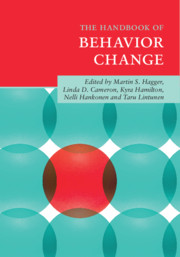Book contents
- The Handbook of Behavior Change
- The Handbook of Behavior Change
- Copyright page
- Dedication
- Contents
- Figures
- Tables
- Sidebars
- Contributors
- 1 Changing Behavior: A Theory- and Evidence-Based Approach
- Part I Theory and Behavior Change
- 2 Changing Behavior Using the Theory of Planned Behavior
- 3 Changing Behavior Using Social Cognitive Theory
- 4 Changing Behavior Using the Health Belief Model and Protection Motivation Theory
- 5 Changing Behavior Using the Common-Sense Model of Self-Regulation
- 6 Changing Behavior Using the Model of Action Phases
- 7 Changing Behavior Using the Health Action Process Approach
- 8 Changing Behavior Using Self-Determination Theory
- 9 Changing Behavior Using Control Theory
- 10 Changing Behavior Using the Transtheoretical Model
- 11 Changing Behavior Using Integrative Self-Control Theory
- 12 Changing Behavior Using the Reflective-Impulsive Model
- 13 Changing Behavior Using Habit Theory
- 14 Changing Behavior by Changing Environments
- 15 Changing Behavior Using Integrated Theories
- 16 Changing Behavior Using Social Identity Processes
- 17 Changing Behavior Using Ecological Models
- 18 Changing Behavior Using Theories at the Interpersonal, Organizational, Community, and Societal Levels
- Part II Methods and Processes of Behavior Change: Intervention Development, Application, and Translation
- Part III Behavior Change Interventions: Practical Guides to Behavior Change
- Index
- References
15 - Changing Behavior Using Integrated Theories
from Part I - Theory and Behavior Change
Published online by Cambridge University Press: 04 July 2020
- The Handbook of Behavior Change
- The Handbook of Behavior Change
- Copyright page
- Dedication
- Contents
- Figures
- Tables
- Sidebars
- Contributors
- 1 Changing Behavior: A Theory- and Evidence-Based Approach
- Part I Theory and Behavior Change
- 2 Changing Behavior Using the Theory of Planned Behavior
- 3 Changing Behavior Using Social Cognitive Theory
- 4 Changing Behavior Using the Health Belief Model and Protection Motivation Theory
- 5 Changing Behavior Using the Common-Sense Model of Self-Regulation
- 6 Changing Behavior Using the Model of Action Phases
- 7 Changing Behavior Using the Health Action Process Approach
- 8 Changing Behavior Using Self-Determination Theory
- 9 Changing Behavior Using Control Theory
- 10 Changing Behavior Using the Transtheoretical Model
- 11 Changing Behavior Using Integrative Self-Control Theory
- 12 Changing Behavior Using the Reflective-Impulsive Model
- 13 Changing Behavior Using Habit Theory
- 14 Changing Behavior by Changing Environments
- 15 Changing Behavior Using Integrated Theories
- 16 Changing Behavior Using Social Identity Processes
- 17 Changing Behavior Using Ecological Models
- 18 Changing Behavior Using Theories at the Interpersonal, Organizational, Community, and Societal Levels
- Part II Methods and Processes of Behavior Change: Intervention Development, Application, and Translation
- Part III Behavior Change Interventions: Practical Guides to Behavior Change
- Index
- References
Summary
A preponderance of theories have been adopted to identify the determinants of behavior. Despite claims of generalizability, research applying these theories has identified gaps or boundary conditions that delimit their application. Theory integration provides one means to address these gaps. This chapter outlines the contribution of integrated theories to advancing knowledge of behavior change. Four approaches to theory integration are identified and summarized: additional constructs, core constructs, expert consensus, and utility-based approaches. Theory integration is often motivated by the need to reduce redundancy in constructs across existing theories and improve their predictive power to arrive at optimally comprehensive, parsimonious, explanations of behavior. Examples of integrated theories are provided and how they have contributed to theory development outlined. Behavior change interventions based on integrated theory comprise multiple techniques that target change in the constructs that set the integrated theory apart from its constituent theories. While some interventions based on integrated theories have demonstrated efficacy in changing behavior, future research on integrated theories needs to adopt factorial designs that independently target change in integrated theory constructs. Such research will demonstrate the independent and interactive effects of techniques based on the integrated theory on behavior and on measures of the targeted theory construct.
Keywords
Information
- Type
- Chapter
- Information
- The Handbook of Behavior Change , pp. 208 - 224Publisher: Cambridge University PressPrint publication year: 2020
